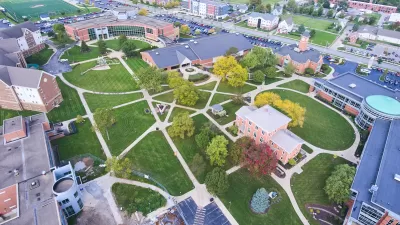Despite the improving economy, the outlook for the higher education sector is still poor, especially between the endowment haves and have-nots. Another factor playing a critical role in the success or failure of institutions: their location.

"What’s long been said about real estate is increasingly true for colleges as well—it’s all about location," reports Jeffrey Selingo.
Although education institutions have provided economic development opportunities in many urban areas, colleges and universities in rural areas are in danger of being left behind. "We are seeing creative juices and financial rewards flowing to a more select group of cities and urban areas. This has significant consequences for colleges in struggling towns and declining manufacturing cities," writes Selingo.
Remaining relevant and competing in an urbanizing country, according to Selingo, is "a task that colleges in those struggling towns often can’t afford." To make the case for the uncertain economic situation of higher education, Selingo cites a report released earlier this month by Moody's Investor's Services issuing a negative outlook for the higher education sector in the United States. In fact, the location of many colleges correlated to their financial performance. According to Selingo, "the credit-rating agency found that a quarter of regional public institutions—usually located in sparsely populated areas of their states—saw declines last year in their net tuition revenue, the cash that colleges have left after giving out financial aid to students. Among private colleges, Moody’s found 'a growing disparity between tuition-dependent colleges and market-leading universities with diverse revenue sources.'"
FULL STORY: Location, Location, Location. Urban Hot Spots Are the Place to Be.

Alabama: Trump Terminates Settlements for Black Communities Harmed By Raw Sewage
Trump deemed the landmark civil rights agreement “illegal DEI and environmental justice policy.”

Study: Maui’s Plan to Convert Vacation Rentals to Long-Term Housing Could Cause Nearly $1 Billion Economic Loss
The plan would reduce visitor accommodation by 25% resulting in 1,900 jobs lost.

Planetizen Federal Action Tracker
A weekly monitor of how Trump’s orders and actions are impacting planners and planning in America.

Waymo Gets Permission to Map SF’s Market Street
If allowed to operate on the traffic-restricted street, Waymo’s autonomous taxis would have a leg up over ride-hailing competitors — and counter the city’s efforts to grow bike and pedestrian on the thoroughfare.

Parklet Symposium Highlights the Success of Shared Spaces
Parklets got a boost during the Covid-19 pandemic, when the concept was translated to outdoor dining programs that offered restaurants a lifeline during the shutdown.

Federal Homelessness Agency Places Entire Staff on Leave
The U.S. Interagency Council on Homelessness is the only federal agency dedicated to preventing and ending homelessness.
Urban Design for Planners 1: Software Tools
This six-course series explores essential urban design concepts using open source software and equips planners with the tools they need to participate fully in the urban design process.
Planning for Universal Design
Learn the tools for implementing Universal Design in planning regulations.
Caltrans
Smith Gee Studio
Institute for Housing and Urban Development Studies (IHS)
City of Grandview
Harvard GSD Executive Education
Toledo-Lucas County Plan Commissions
Salt Lake City
NYU Wagner Graduate School of Public Service





























